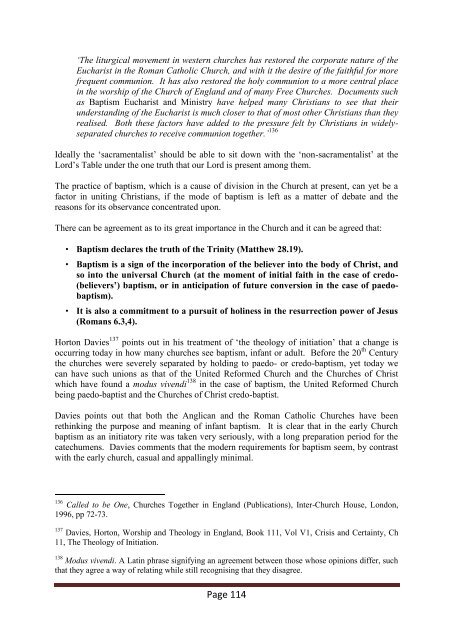Digging Out the Embedded Church - The Maranatha Community
Digging Out the Embedded Church - The Maranatha Community
Digging Out the Embedded Church - The Maranatha Community
Create successful ePaper yourself
Turn your PDF publications into a flip-book with our unique Google optimized e-Paper software.
„<strong>The</strong> liturgical movement in western churches has restored <strong>the</strong> corporate nature of <strong>the</strong><br />
Eucharist in <strong>the</strong> Roman Catholic <strong>Church</strong>, and with it <strong>the</strong> desire of <strong>the</strong> faithful for more<br />
frequent communion. It has also restored <strong>the</strong> holy communion to a more central place<br />
in <strong>the</strong> worship of <strong>the</strong> <strong>Church</strong> of England and of many Free <strong>Church</strong>es. Documents such<br />
as Baptism Eucharist and Ministry have helped many Christians to see that <strong>the</strong>ir<br />
understanding of <strong>the</strong> Eucharist is much closer to that of most o<strong>the</strong>r Christians than <strong>the</strong>y<br />
realised. Both <strong>the</strong>se factors have added to <strong>the</strong> pressure felt by Christians in widelyseparated<br />
churches to receive communion toge<strong>the</strong>r.‟ 136<br />
Ideally <strong>the</strong> „sacramentalist‟ should be able to sit down with <strong>the</strong> „non-sacramentalist‟ at <strong>the</strong><br />
Lord‟s Table under <strong>the</strong> one truth that our Lord is present among <strong>the</strong>m.<br />
<strong>The</strong> practice of baptism, which is a cause of division in <strong>the</strong> <strong>Church</strong> at present, can yet be a<br />
factor in uniting Christians, if <strong>the</strong> mode of baptism is left as a matter of debate and <strong>the</strong><br />
reasons for its observance concentrated upon.<br />
<strong>The</strong>re can be agreement as to its great importance in <strong>the</strong> <strong>Church</strong> and it can be agreed that:<br />
• Baptism declares <strong>the</strong> truth of <strong>the</strong> Trinity (Mat<strong>the</strong>w 28.19).<br />
• Baptism is a sign of <strong>the</strong> incorporation of <strong>the</strong> believer into <strong>the</strong> body of Christ, and<br />
so into <strong>the</strong> universal <strong>Church</strong> (at <strong>the</strong> moment of initial faith in <strong>the</strong> case of credo-<br />
(believers’) baptism, or in anticipation of future conversion in <strong>the</strong> case of paedobaptism).<br />
• It is also a commitment to a pursuit of holiness in <strong>the</strong> resurrection power of Jesus<br />
(Romans 6.3,4).<br />
Horton Davies 137 points out in his treatment of „<strong>the</strong> <strong>the</strong>ology of initiation‟ that a change is<br />
occurring today in how many churches see baptism, infant or adult. Before <strong>the</strong> 20 th Century<br />
<strong>the</strong> churches were severely separated by holding to paedo- or credo-baptism, yet today we<br />
can have such unions as that of <strong>the</strong> United Reformed <strong>Church</strong> and <strong>the</strong> <strong>Church</strong>es of Christ<br />
which have found a modus vivendi 138 in <strong>the</strong> case of baptism, <strong>the</strong> United Reformed <strong>Church</strong><br />
being paedo-baptist and <strong>the</strong> <strong>Church</strong>es of Christ credo-baptist.<br />
Davies points out that both <strong>the</strong> Anglican and <strong>the</strong> Roman Catholic <strong>Church</strong>es have been<br />
rethinking <strong>the</strong> purpose and meaning of infant baptism. It is clear that in <strong>the</strong> early <strong>Church</strong><br />
baptism as an initiatory rite was taken very seriously, with a long preparation period for <strong>the</strong><br />
catechumens. Davies comments that <strong>the</strong> modern requirements for baptism seem, by contrast<br />
with <strong>the</strong> early church, casual and appallingly minimal.<br />
136 Called to be One, <strong>Church</strong>es Toge<strong>the</strong>r in England (Publications), Inter-<strong>Church</strong> House, London,<br />
1996, pp 72-73.<br />
137 Davies, Horton, Worship and <strong>The</strong>ology in England, Book 111, Vol V1, Crisis and Certainty, Ch<br />
11, <strong>The</strong> <strong>The</strong>ology of Initiation.<br />
138 Modus vivendi. A Latin phrase signifying an agreement between those whose opinions differ, such<br />
that <strong>the</strong>y agree a way of relating while still recognising that <strong>the</strong>y disagree.<br />
Page 114








